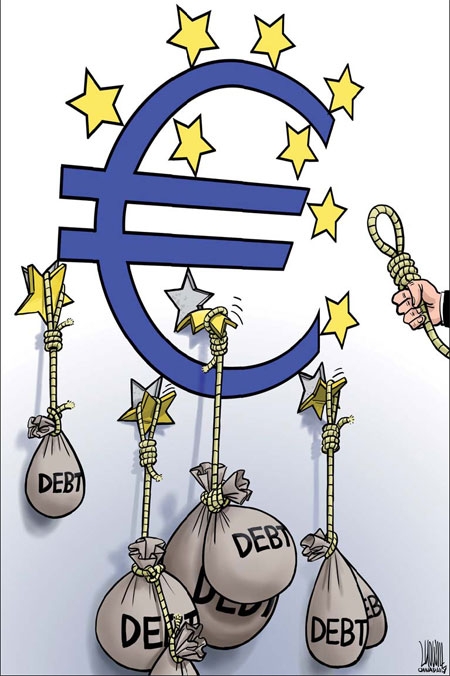Should China help the Europeans?
Updated: 2011-11-04 10:30
By Giles Chance (China Daily European Weekly)
|
|||||||||
|
 |
In 2009, my book China and the Credit Crisis: the emergence of a new world order was described by some Western critics as alarmist and one-sided. Now, though, the criticism seems to have gone away. Could there be a more dramatic demonstration of the shifting world order than last week's telephone call from French President Nicolas Sarkozy to President Hu Jintao asking for Chinese financial assistance for Europe's bailout plan?
I've heard famous American economists criticize China for holding excessive foreign reserves, complaining that China's (and of course that of the US) interests would be better served if China was to sharply revalue its currency against the dollar, stop accumulating foreign reserves, and spend its savings on importing food and luxury goods from the West. But China needs its foreign reserves as an insurance policy against Western financial mismanagement, and as a hedge against the threat of financial attacks similar to the Asian crisis in 1997 and 1998, when Western-based investors successfully disrupted the currencies and economies of a series of East Asian countries.
And where would the US banking flagships Morgan Stanley and Citigroup have been in 2008 if Chinese savings had not come to their rescue at a critical moment? Now Sarkozy's call from Europe underlines the key message: excessive spending and the disdain for saving in the Western developed economies have enormously reduced their economic strength and weakened their positions relative to the so-called "emerging" world. But have the Western countries really come to terms with that relative decline?
The recent European summit attempted to draw a line under the euro's woes, by taking much more forceful actions which, it was hoped, would propel policymakers beyond the market's expectations, so as to give them more time to calm things down. The euro leaders agreed to force European banks to "voluntarily" recognize that 50 percent of their Greek loans were not going to be paid; to increase the financial aid package for Greece; and to boost the European bailout fund by some 560 billion euros to 1 trillion euros; a size believed to be large enough to deter market traders from attacking the euro's weaker members, like Greece and Portugal.
The market's response to the new accord was quick and brutal. No sooner had the European agreement been published than a day later, on Oct 28, a bond auction showed Italian borrowing costs rising on 10-year debt to 6 percent, the highest they have been since the European crisis began early in 2010. In the market's opinion, the much-heralded European summit had changed nothing. There was still no way in which Greece could meet its public debt obligations, estimated at 120 percent of GDP even after its brand-new aid package. The economic prospects for other weaker south European countries (Portugal, Spain, Cyprus) continued to look very grim as the need to meet debt obligations forced these countries to reduce spending, in the process cutting growth, increasing unemployment and making even more unlikely a successful exit from their financial train-wrecks.
Increasingly severe social unrest in Greece, and the promise of strikes and public expressions of violence in other hard-pressed southern European countries are making it obvious that these countries simply cannot share the same currency as Germany. They desperately need to devalue to regain competitiveness, by between 30 percent and 50 percent.
If they don't leave the euro system, then sooner or later - and probably sooner - their populations will rise up, overthrow their liberal democratic governments and replace them with dictatorships who, inspired by waves of nationalist fervor, will attempt to reduce unemployment and bring back the good times by reintroducing national currencies, defaulting on foreign debts and introducing price controls on food and other essential commodities. There's a limit to how far people without jobs and futures will go to support the European ideal. Greece, for one, is probably close to reaching the exit point.
In other words, the European "solution" which was reached last week is a temporary, not a permanent stopping-place, and the markets immediately recognized that. The euro system has not reached the end-game. The present situation is not sustainable, because several countries who are presently within the euro - Greece, Cyprus, Portugal, Ireland, probably Spain and Italy - will have to exit the system to restore growth and unemployment to their economies and maintain their democracies.
In one, two or three years, after several more summits and "solutions", and the destruction of some political reputations, we will finally arrive at ground zero, which may look something like this: a smaller euro system with Germany at its core, also containing a number of northern European countries, including France, all within a reasonable distance (say maximum 10 percent on an annualized basis) of remaining competitive with Germany, and without the weaker, but still democratic "southern" members.
For the success of any currency system stands or falls on relative rates of productivity growth of the various system members. The less productive parts of the US, like Detroit today, can never leave the dollar system, so Detroit is forced to adjust to being uncompetitive in the US economy by receiving economic transfers via unemployment benefits and subsidies, and by exporting workers to other parts of the US, where employment can be found.
But neither Charlemagne nor Napoleon, nor Hitler succeeded in unifying Europe, which defiantly remains a collection of nation-states, each with its own language and culture. In a situation like the present one, it's certainly not impossible for national considerations to dominate European ones, and for some countries to leave the euro system - and they will. The unresolved question is whether the countries that leave, led by Greece, form their own second-tier currency system, or whether they simply go back to having their own currencies. I think the latter outcome is much more likely, because a currency union between economically weak and volatile countries probably won't work.
So - what is China to do? Last weekend, I asked the students in my class at Guanghua whether they thought China should help Europe out financially. A Chinese second-year student said that China had a moral duty to help Europe, but should make sure that its money remained safe. Another Chinese student questioned the need for China to help Europe unless it got something substantial back. A third said that China deserved greater respect from the other major countries in the world. Maybe, he said, this request for help from Europe presented an opportunity for China to buy some of this respect.
On the one hand, China can see all the benefits of playing the role of global statesman: a grateful Europe, recognition of China's "free market status", increased global influence marked by China's promotion to the second most powerful country in the IMF ahead of Japan. But on the other hand - what are the dangers and disadvantages of writing Europe a big check? The risk is that Europe and the euro remain work-in-progress for some time to come. We are not at the end-game yet. If China puts money in now, it will not be the last European request for support.
Like an investor in an early-stage company, China has to measure and balance the goodwill and other advantages to be gained by investing early on, against the difficulties and devaluation or dilution that may be faced later when more money is needed, and China has already invested. By investing now, China may become part of the European problem, not part of the solution. It's true that Europe is China's largest export market; but isn't it better for China to withhold funds and to put pressure on Europe now in order to reach the difficult, sustainable end-solution sooner rather than later?
Europeans countries, from France down, still have not woken up to the reality that they need to make major economic and social reforms. These hard changes are necessary in order for these countries to restore economic competitiveness versus surging productivity improvements in the emerging countries, so that European social security systems can be maintained at something close to the present gold-plated levels. The Europeans' recent behavior demonstrates to the neutral observer that they (collectively) still think they are No 1 and they can persuade the newly "rich" countries like China to support their style of living - a style which has become unaffordable for most of them.
As an investor, does China want to get closely involved with Europe before the European process of coming to terms with itself has run its course? Would large investments now in the European bailout facility by China and other surplus countries stimulate change and economic growth in Europe? Or would such investments retard change? Wouldn't China be better off waiting until the euro development has reached its "denouement", and wouldn't Europe be better off facing reality now rather than later, when the money really has run out?
The author is visiting professor at the Guanghua School of Business, Peking University. The opinions expressed in the article do not necessarily reflect those of China Daily.











